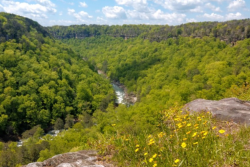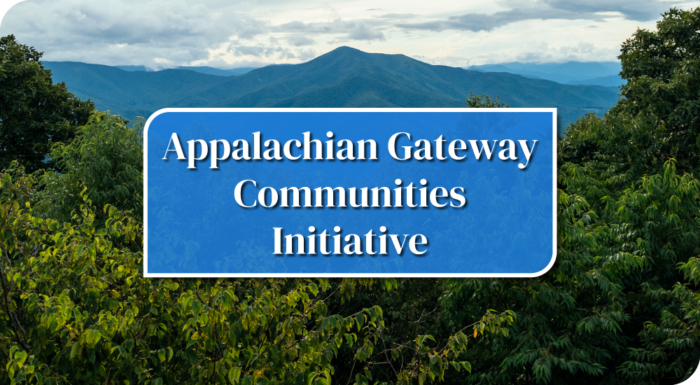
Nested in the Northeast corner of Alabama, Lookout Mountain is a perfect example of a gateway asset, containing four parks with countless hiking and biking trails, cliff faces, and waterfalls. The twelve-person team from Cherokee, Alabama attended the 2016 Appalachian Gateway Communities Initiative (AGCI) workshop in Rogersville, Alabama knowing that they could leverage the mountain’s parks in order to transform the three-county region of Cherokee, DeKalb, and Etowah counties into a premiere destination for outdoor recreation.
The team’s initial goal was a lofty one: to build a 17-mile biking trail system to unify the region’s four parks through one continuous trail. However, after listening to workshop speakers discuss financial planning and state and federal support, the team realized they needed to reassess their strategy to develop a more pragmatic, achievable goal. Following an asset-mapping exercise, the team recognized that Lookout Mountain could be a tourist destination even without a unifying trail. This painted a clear way forward for the region’s stagnating post-extraction economy. From here, the team created a mission statement for their project, which they still use today: “Three counties partnering to link their natural resources to create a multi-purpose seeded trail to increase visitation, resulting in increases to local economy.”
During the workshop, the team began to work on an action plan for a project that would eventually be called Alabama’s Lookout Mountain Adventures, a full-color 3-panel pamphlet which details the various outdoor recreation opportunities in the region and cleverly encourages tourists to visit all of the parks. The pamphlet also places an emphasis on the region’s Appalachian heritage, an identity which the team had not even considered prior to the workshop. With the help of the National Endowment for the Arts and the Appalachian Regional Commission, 20,000 pamphlets were produced as part of its initial run and nearly all of them have been distributed.
It opened our eyes to be able to share that with the world–that we’re part of the Appalachian Region.
THERESA HULGAN, TEAM MEMBER



Visitor and Economic Growth
In the six years following the workshop and the pamphlet’s production, tourism’s value to the region has become increasingly clear. As the team’s pamphlet laid the groundwork for continued collaboration between local economies, visitation exploded in the Lookout Mountain parks. In 2016, Little River Canyon National Preserve saw under 250,000 visitors, which expanded to over 850,000 visitors in 2021. As a result of this increase in tourism, all four parks have been able to expand their capacity with new amenities, including hiking and biking trails and campsites.
Since the workshop, two of the counties (Etowah and Cherokee) have seen their ARC economic designations move from at-risk to transitional, signaling the possibility that their workshop-inspired move into a more tourism-driven economy has had significant positive impacts on the region. In 2023, the group plans to continue their Appalachian-focused regional marketing, collaborating even six years later to help develop their community’s image as it transforms into an increasingly popular tourist destination.


